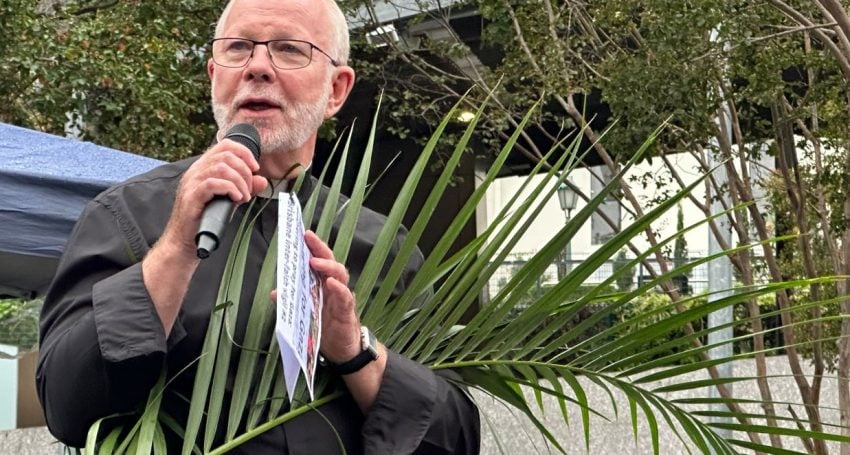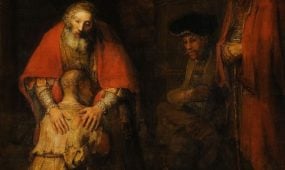Seeing life differently through Holy Week
Reflections
“The liturgies of Holy Week can contribute to our becoming more empathetic by exposing us to situations that we have yet to encounter in our lives. This is because the events of Holy Week are recorded with details that allow us to identify the time of year and the days of the week on which they are located,” says The Very Rev’d Dr Peter Catt

With eyes at the back of our heads
we see a mountain
not obstructed with woods but laced
here and there with feathery groves.
The doors before us a facade
that perhaps has no house in back of it
are too narrow, and one is set high
with no doorsill. The architect sees
the imperfect proposition and
turns eagerly to the knitter.
Set it to rights!
The knitter begins to knit.
For we want
to enter the house, if there is a house,
to pass through the doors at least
into whatever lies beyond them,
we want to enter the arms
of the knitted garment. As one
is re-formed, so the other,
in proportion.
When the doors widen
when the sleeves admit us
the way to the mountain will clear,
the mountain we see with
eyes at the back of our heads, mountain
green, mountain
cut of limestone, echoing
with hidden rivers, mountain
of short grass and subtle shadows.
Denise Levertov, “With Eyes at the Back of Our Heads”
One of the challenges we all face, I think, is developing the capacity to see life through the eyes of others; to see things from a different perspective. The better we become at doing this, the more likely we are to be empathetic towards, rather than misunderstand, the plight of others.
The liturgies of Holy Week can contribute to our becoming more empathetic by exposing us to situations that we have yet to encounter in our lives. This is because the events of Holy Week are recorded with details that allow us to identify the time of year and the days of the week on which they are located. So we have the opportunity to live in real time the story of this dramatic week in the life of Jesus and to experience aspects of the story from varying perspectives.
Advertisement
We begin on Palm Sunday by waving palms and joining the welcoming and excited crowd. We then play the part of Jesus in the rehearsal of the Passion, and so get to identify with Jesus as the crowd turns on him. Here we have the opportunity to experience the bewilderment, confusion and panic that happens when we are misunderstood and things suddenly go pear-shaped. And we can recognise that there are many people experiencing those feelings in their own lives.
On Maundy Thursday we can participate in the foot washing and so face the challenges that that act of intimacy and service presents to us. Many of us find being served by others a difficult space to inhabit. But if we are willing to enter into the discomfort, we can gain insights into the life of the vulnerable; people who are solely dependent on others. A situation that we often associate with a loss of agency can become a place where we gift others by allowing them to serve us.
Advertisement
We are also offered the opportunity to discover how the intimacy of communion holds these complexities together.
The Maundy Thursday liturgy concludes with the stripping of the altar and the abandonment of Jesus in the garden by the disciples. The story touches our times of feeling abandoned and the times we have abandoned others. The story becomes raw and reminds us of our rawness. And yet we experience this together and so find a sense of solidarity in our shared humanity and are invited express a solidarity with those who are doing it tough and who do not have the gift of community to support them.
On Friday we are offered the opportunity to find solidarity in our broken moments. In the Noon liturgy we are invited to stand or kneel before the cross. We can leave at the foot of the cross a symbol of the things we wish to leave behind or let go. We can acknowledge our regrets and feel for those who live with regret. We have the opportunity to feel more deeply our own tragedies and the tragedies of others. To be at one with those who are suffering loss.
Holy Saturday sees us presented with the complexities that arise when we face the dissolution of the way things were or that come as we find ourselves having to wait to find out what is coming our way next. We have the opportunity to be aware of those who are waiting for news of loved ones or the results of medical tests.
And then on Easter Day we become aware of the capacity life has to surprise us and the hope that suggests that we might find new life in the face of failure and loss.
As Denise Levertov suggests in the poem, “With eyes at the back of our heads”, Holy Week gives the opportunity to see life differently, to appreciate things from a different angle.






